This “Limited Edition” Blu-ray from Radiance Films is currently available for purchase.
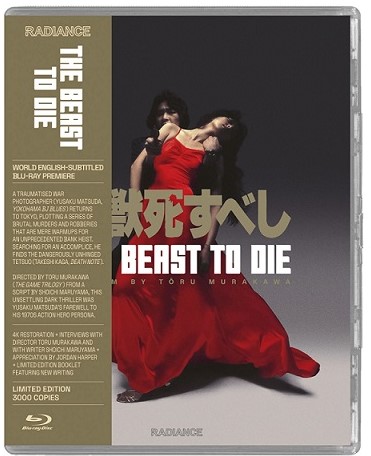
While I had seen a film or two over the years starring Yūsaku Matsuda, I certainly never knew of his legendary status and influence on Japanese cinema. He lived a remarkably short life, passing away from cancer at the age of 40. But over his brief career, he made an impression. After appearing as the lead in the hit TV show Tantei Monogatari, he began appearing in films. Films like Detective Story, The Killing Game, The Most Dangerous Game, Yokohama BJ Blues, Crest of the Wolf and The Family Game are extremely well-regarded in their homeland because of the actor’s intense portrayals of characters. His final role would come as the villain in Ridley Scott’s 1989 film Black Rain, which he shot while suffering from cancer.
Another legendary title in the performer’s catalog is The Beast to Die, aka Yajû Shisubeshi, which is now arriving from Radiance Films as a “Limited Edition” Blu-ray. This film marked the final official collaboration between the actor and director Toru Murakawa, who had previously paired on The Most Dangerous Game and The Killing Game. The pair set up special and interesting rules for their final collaboration (which will be detailed later in this review) and the results are quite striking. This is a memorable film that introduced some new approaches to Japanese cinema, with another exceptional performance by the star.
Journalist Date (Matsuda) returning home from the Vietnam War is at the center of this tale. Suffering from PTSD and other psychological issues, he immediately begins acting out violently. After murdering a police officer, he heads over to an illegal gambling operation, guns down the club managers and takes their money. He also plans a major bank heist. When he isn’t killing, he has awkward meetings with old acquaintances. While attending a classical music concert, Date does draw the attention of a sweet young woman who could be the answer to his problems. Unfortunately, these potentially helpful relationships never come to fruition, leaving the character on a downward spiral into brutality. Along the way, he meets a like-minded individual willing to participate in the robbery, but the two never do anything to assist each other in dealing with their conditions. In fact, they feed off of each other, with their final actions feeling like a traumatizing wartime episode.
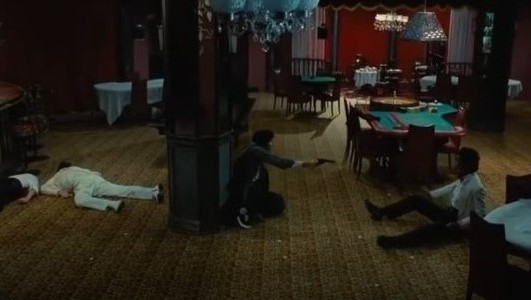
It’s a very dark movie, but a dynamic one due to Matsuda’s impressive performance. When violence erupts, it’s shocking and anything but stylized. The slayings are messy and awkward, While the character is distant and his behavior is brutal, he doesn’t come across as a maniac. Viewers ultimately get more information about Date’s past as the story progresses, making him a tragic figure. And the actor is charismatic enough to keep viewers interested in his predicament. There are also a couple of moments of quiet reflection from the character that do help to make his story a little more relatable.
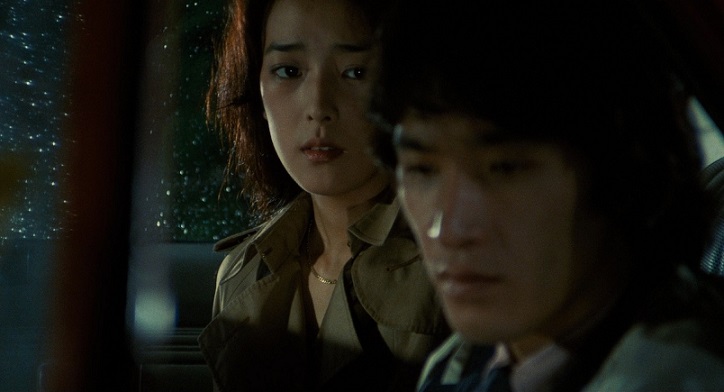
Additionally, it is intriguing to see others try (in particular, his potential love interest) attempt to reach out and make a connection, only to ultimately be politely rebuffed. These scenes are handled very well, with one brief relationship leading to a heartbreaking outcome. The movie subtly says a lot about war trauma and serious psychological issues not being acknowledged or treated by the country. And the unusual finale outside the concert hall lingers in the mind long after the credits roll.
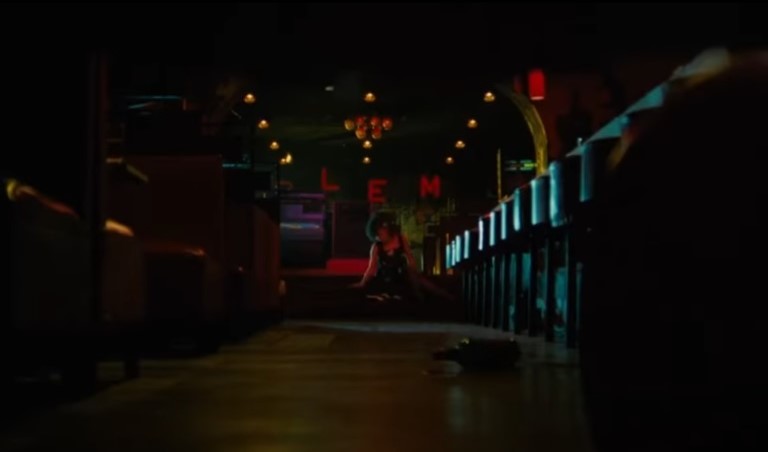
Much of the film takes place in interior environments, dark streets and clubs, and the picture benefits from the shooting style. This is a very nice-looking transfer with natural grain and no visible damage or problems on the source material. Apparently, the film was transferred in 4K from the Japanese production company for this release, and they’ve done a stellar job.
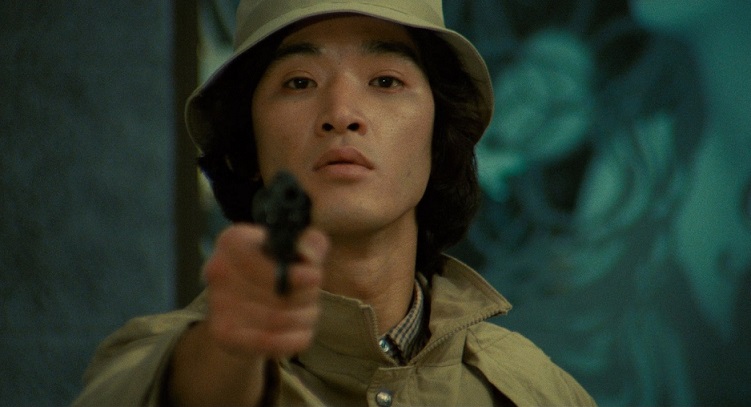
The discussion with director Toru Murakawa is extremely enlightening and details the production process. After working together twice, the two felt that this film should be their final collaboration. The filmmaker and Matsuda made a deal. He wouldn’t tell the actor how to interpret the character, and the performer wouldn’t comment on his shot set-ups and storytelling technique. Apparently, the approach worked efficiently for the two. Murakawa also talks about the ending, which is vague enough that it can be interpreted differently by viewers. The two agreed that they didn’t care for the script’s shootout- oriented finale and wanted to try something different. They came up with what appears in the movie, involving the character waking up in an empty music hall after his final acts of rampage in the night. He essentially does get injured and, rocking his body around on a stairwell, almost appears to also fall prey to the literal light of the world outside. Both were pleased and the ending does make a lasting impression.
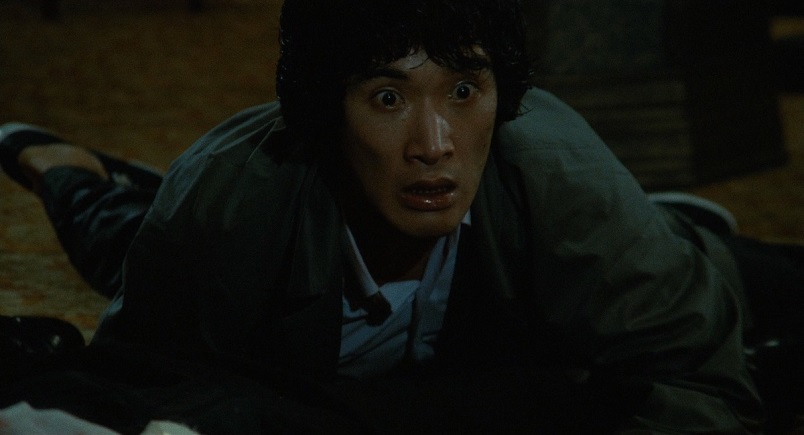
There is an interview with the screenwriter, who explains some of the themes of the movie. He and other bonus interviewees note that the character is, to a degree, acting out against the rigidity of normal life in Japan, where everything was ordered to the point where personal freedom didn’t seem to exist. Some of Date’s bizarre acts are committed randomly with the intent of just trying to feel something while living in a world he no longer feels connected to. Due to the unique partnership between the lead and director, the writer also details what elements of his story were changed, and what remained the same. Naturally, the interpretive ending was not his, and he offers a couple of ideas of how others may have read it. In the end, he admits that while it wasn’t what he intended, it does work well in the end and manages to keep audiences thinking after the credits roll.
Additionally, there is a discussion with a film expert on the title and what makes it so striking to him. He notes that there are a lot of similarities between American crime and noir films and Japanese efforts. The speaker mentions many of the film’s notable scenes and how they play off of genre conventions in a fresh way. The speaker makes a very convincing case that these types of films from both countries make for some of the genre’s best.
So, this is another great presentation of a little known (in
North America) Japanese film that pushes boundaries and delivers a chilling
portrait of a broken mind. The presentation is excellent and the bonus features
help one get an even clearer picture of the film’s subtext, deeper meanings and
how it fits into the crime film genre. The Beast to Die is a very strong
film and this disc is highly recommended.


